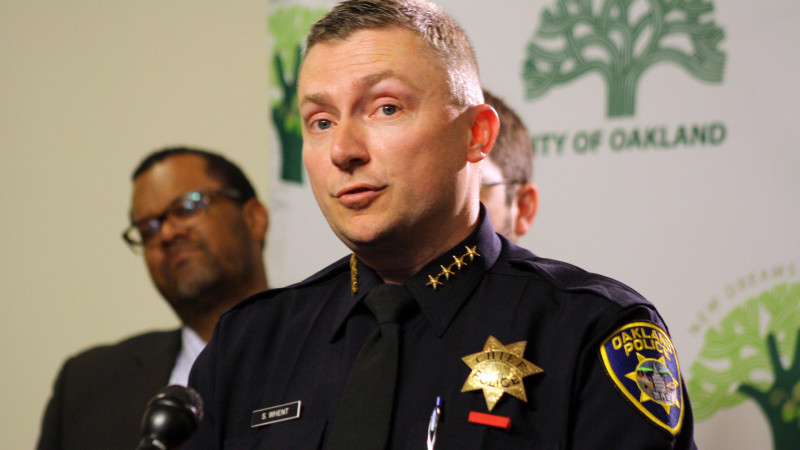A woman raises her hand. Sandy Padnos has been trying to organize her neighborhood to work more closely with the police on crime. “I can’t even tell you how shocked I was that some of our neighbors -- neighbors of color -- had an entirely different experience with the police in Oakland, and wanted nothing to do with what we were so sincere about doing,” she says.
Whent tells Padnos that he understands. “We’re not going to change it overnight. There’s no way. This is a decades-long history. And we as a police department have to start out with owning our history.”
In the back of the class, Brian Bingham raises his hand. He's a 32-year-old African-American. Bingham is a member of the Citizens' Police Review Board and works with young people in Juvenile Hall.
Addressing Whent, he says, “I’ve never heard you speak, and don’t know when I’ll hear you speak again, but that meant volumes for me. And it gave me some hope to hear that from the top coming down. Because acknowledging there is a problem is very huge in building that trust.”
This department has been under federal court supervision for 12 years now. Whent insists things are changing: There's more transparency, better training and only one officer-involved shooting in nearly 22 months. Whent says the past average was eight a year.
He is clearly trying to win this group over. But the Citizens Police Academy is really about understanding how police work gets done. So a week later, the class heads to East Oakland to meet the real first responders: dispatch.
Nikita Williams-Pierre is a 15-year veteran police dispatcher. She asks a caller, “What happened? Did you see any vehicle speeding off?”
As it turns out, this Monday evening is more like a Saturday night in terms of the number and types of crimes being committed on the streets of this city.
Pointing to a number of priority calls on her computer screen, Williams-Pierre says, “We just had a major incident here -- we just had yet another major incident as well ...” An earlier dispatch involves a gunbattle in West Oakland, which the class later learns killed a young mother, who was trying to protect her children.
Police are so busy on this night that the officer who was supposed to talk to the class is instead at the West Oakland shooting. Lt. Steve Paich steps in to take his place -- but then he's suddenly called away, saying, “Now I have to go to Highland, it’s related. Shots fired at Highland.”
And on that note, this second class comes to an end. Tonight this group got a glimpse of a hard and often violent reality that police and many people in Oakland deal with every day. The goal here is that people in this academy will become ambassadors of sorts between police and their communities.
Brian Bingham could be a candidate, though as a member of the Citizens' Police Review Board, he will likely keep a critical eye on a department promising big changes:
“You know, we have this incongruence with the community and the police department that stems from, you know, a long history of police brutality, misconduct and militarization and things like that. And so I would love to be a part of bridging that gap.”
Bingham and the rest of the academy are set to graduate next month.
